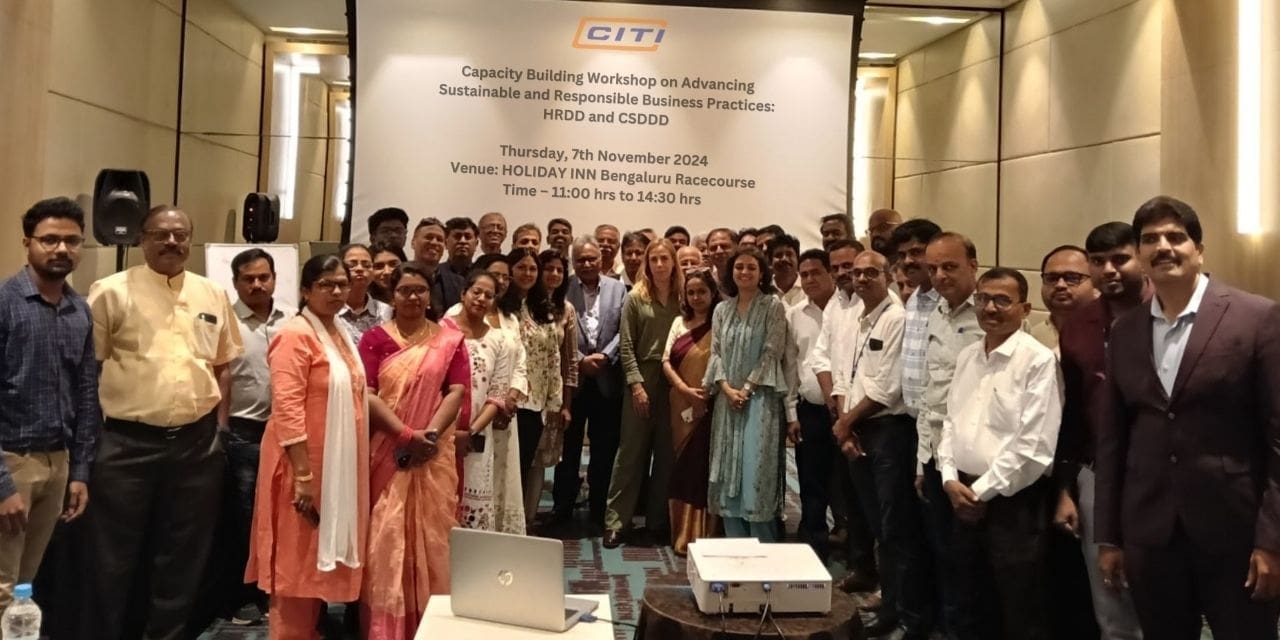Today in Bengaluru, the Confederation of Indian Textile Industry (CITI) held a ground-breaking capacity-building workshop that focused on important aspects of ethical and sustainable business practices in the textile and clothing industries. Titled “HRDD, CSDDD, and Chemical Compliance Workshop – Bengaluru,” the event sought to equip Indian suppliers to handle the changing regulatory environment, including the Human Rights Due Diligence (HRDD) and Corporate Sustainability Due Diligence Directive (CSDDD) of the European Union.
The program began with a thought-provoking introduction from CITI Secretary General Ms. Chandrima Chatterjee, who greeted business leaders and emphasized the growing importance of conforming to international standards in order to remain competitive. The chairman of CITI and Banswara Syntex Ltd., Mr. Rakesh Mehra, emphasized the necessity for companies to adjust to new legal frameworks and the growing global trend of incorporating ethical business practices into operations.
The Regional Chairman of CMAI-SR, Shri H.S. Devaprasad, shared his thoughts on the changing due diligence environment and encouraged Indian suppliers to take advantage of these developments in order to maintain their position in the global market. Mr. Venkatesh S, Chief Compliance Officer at Shahi Exports Pvt. Ltd., gave practical advice on how to get over obstacles with HRDD frameworks in a session on compliance issues, giving vendors doable answers.
The day’s main topics were the growing significance of the EU market for India’s exports of clothing and textiles. A comprehensive review of the CSDDD and HRDD frameworks was given by experts, who emphasized responsibility, transparency, and the incorporation of environmental sustainability and human rights into corporate operations. In addition to creating difficulties for compliance, these legislative changes offer manufacturers the chance to become more competitive by implementing more environmentally friendly methods. Participants actively discussed the need for workable solutions and the intricacies of compliance expenses. The establishment of a forum for suppliers to talk about difficulties, voice worries, and obtain important resources that would keep them on the cutting edge was a major lesson learned.
During the technical session, Ms. Annabel Meurs, Associate Director at Fair Wear Foundation, and Ms. Mousumi Sarangi, Country Manager India & Coordinator of Supplier Engagement, gave detailed explanations of the CSDDD and HRDD frameworks. With a focus on incorporating due diligence procedures into corporate plans, they described how these rules are set to become a global norm. The future of supplier-brand contracts was the subject of one of the most interesting conversations. In order to promote greater transparency in their business interactions, panelists urged suppliers to be proactive in drafting mandated due diligence clauses, which are becoming more and more common in contracts.
Although originally relevant to the EU markets, the experts affirmed that these regulations are likely to set a global benchmark in response to the participants’ critical queries regarding their global application. Suppliers were urged to keep themselves updated, learn the lingo used in due diligence, and get ready for a regulatory landscape that will influence international trade in the future. The changing role of retailers—especially big platforms—was also emphasized, with a focus on their duty to guarantee adherence to these new standards.
The Clothing Manufacturers Association of India’s (CMAI) Regional Secretary-South Region, Shri Balaji Rajagopalan, outlined the main conclusions of the workshop in his closing remarks. He reaffirmed how crucial it is for brands, suppliers, and retailers to work together to successfully implement these principles, emphasizing that the sector can only adopt sustainable and ethical business practices by cooperating.
The CITI-organized course has effectively increased awareness and given Indian textile suppliers the skills and information they need to adhere to the EU’s changing legislation, with a focus on incorporating sustainability and human rights into their business operations. India’s textile industry is well-positioned to take the lead in implementing these practices as global standards continue to change, guaranteeing a competitive, sustainable, and ethical future.

